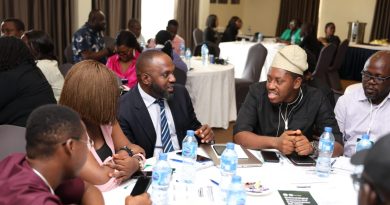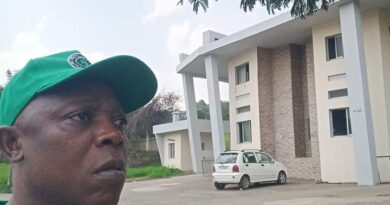Family Planning: How We Support 2,600 Facilities In Nigeria – Marie Stopes
The Country Director of the Marie Stopes International Organisation, Mr Emmanuel Ajah, has explained the health-specific humanitarian activities of the organisation in Nigeria since its inception.
Speaking in an exclusive chat with PRNigeria, Ajah said since inception in 2009, the organisation has helped a lot of women and families in preventing both unwanted pregnancies and avoidable abortions.
He added that the organisation is supporting about 2,600 health facilities across the country with emphasis on family planning.
“If you put the total figure, we are supporting just a little below 2,600 facilities spread across the country with some of them either 50, 100 or 200 capacity as case may be. What we do is we work through our channels
“So as an organisation, we got registered here in 2009 at the invitation of the Federal Ministry of Health and we work collaboratively with the federal and state ministries of Health to provide quality family planning and reproductive health services. Currently we are the biggest provider of family planning service across the country. We have our primary health centres and we support directly working with government to provide services in all the states of the Federation.
“We have our channels of delivery and the first channel of delivery is the public sector channel. The public sector channel is where we identify public sector providers, train them in collaboration with state ministries of health and after the training jointly do supervision to get the providers that have been trained up to speed, so they are able to provide services.
“Before we started this, we work with government to develop the current training manual that is being used by all the partners across the country,” he said.
Ajah noted that the manual used for the organisations operations are available on the website of the Federal Ministry of Health “because, when they disseminated, they had developed supportive supervision tools used and ensure that services are been provided.”
“We equally work with what we call our social franchises. The Blue Star Healthcare Network which is the private angle of the work that we do and they just a little below 150, they are not in all the states because for private sector, it is largely in the south where private sector is more viable to work with. Most of our primary healthcare are privately owned clinics. Again, what we do is identify those who are fully aligned and understand that we can provide family planning service but, what we try to understand is that before we started our intervention, it was very clear that some of this service providers including the private sector were already providing this. So, in what we call harm reduction, we had to put them in and make sure they are properly trained so that they can continue to provide those services.
“We have what we call our MS ladies who are largely in the North are midwives, nurses and senior CHEFS, retired but not tired, some still have services they do that our private or public facilities but we do know that because women are included in certain locations, they only people that can provide family service for them are those who can really identify with them. Therefore, we work with those women to identify a roadmap say this district or this community this is where you work, they are mostly in Kano, Kaduna, Jigawa a little bit in Katsina, Yobe,” he added.
Asked about Zamfara and Sokoto, Ajah told PRNigeria that said: “Sokoto we have a public sector facility and them we have an outreach but we do not have MS ladies. If you add up what we have in the South, we have about 320 PER Nigerian.”
Ajah said the organisation had social marketing channel that distribute it’s products, adding that they have products like Fire Condom which is very effective in preventing STDs and unwanted pregnancies.
He noted that they also have a new product for preventing excessive bleeding after childbirth.
“We equally have a brand of emergency contraceptive that we call back up which we distribute and all of our products have NAFDAC certification, he noted.
Also speaking during the chat, the Director of Programmes the Organisation, Ogechi Onuoha, said:
If you look that the family planning environment in Nigeria and the contribution of MARIE STOPES 30% of the uptake family planning in Nigeria is provided by us so, we have 30% market share.”
“We are covering 10% of the primary healthcare centres in Nigeria.
Across the states, except Anambra you will see Marie Stopes when it comes to family planning. If you go to a state like Imo where we are covering over 200 facilities, we are like the only major producer of family planning service and the FCT coordinator and the Regional subhead are all acknowledging this contribution. We walk with primary healthcare development agencies at the state levels and there is nothing that we do and we not unburden or collaborating with the government, even the in term of demand generation because it is one thing to say you are providing family planning services because of the misconceptions surrounding it, you discover that you go to some places and they chase you away so, but the work we do, we collaborate with community structures like traditional ruler, world development committees and other key influences, and increasingly we are situating that ownership within the community and the community is now driving demand as opposed to them feeling like “they are telling us to what to do”. So we help some community appreciate the benefit of the service and that is what is informing stakeholders across the state in Nigeria during stakeholder dialogue where the team comes and give account of what we are doing in their states.
“The his is done in quarterly basis. This is year is ending, we shall pull out all the reports for each of the state and then by first quarter especially in March or April we make presentations depending on when the states call us because it is not on us to call for the meeting as we are not the only ones making presentation on that day. Their people working on Malaria, Tuberculosis (TB) while other are only doing demand generation who will come and make a presentation of what they are doing in any state within that particular period.
“As an organisation, we have a vision and that vision is warding off pregnancy that is not wanted and that guides what we are doing. Whatever we do, we look at the totality of that woman to ensure we have her fully protected in a way that she does not get pregnant when she does not want,” she said.
By PRNigeria




